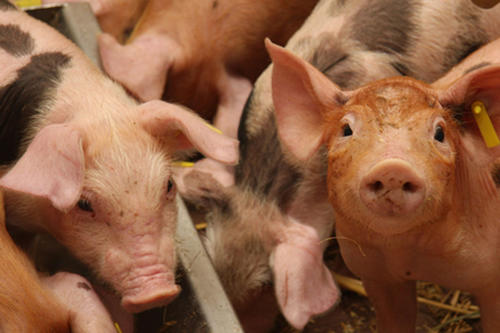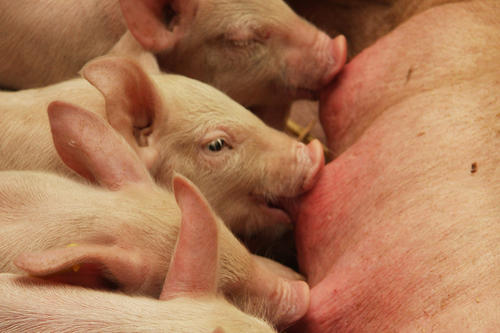Munching for Health
How intestinal bacteria could help reduce the use of antibiotics in raising piglets
Oct 04, 2013
Less medication, healthier animals: Veterinary researchers at Freie Universität Berlin are studying whether, and if so how, probiotics can help reduce the use of drugs commonly used in raising livestock.
Image Credit: Sonja Martens
Healthy milk from their mother: Adding probiotics to a sow’s feed also affects the health of her piglets.
Image Credit: Sonja Martens
Sometimes it’s tiny spheres, but more often it comes in the form of a matte, whitish powder. Neither one looks particularly spectacular. And yet, it is supposed to work minor miracles – at least on the farm. What is it? Probiotics: living microorganisms such as Lactobacillales (an order of bacteria found in lactic acid) or yeast that is added to animal feed – and are then supposed to boost a pig’s health from inside its intestine.
When the bacteria colonize the intestine, the overall flora changes, with the balance shifting toward microbes that have a beneficial effect on the animal’s health. Unfavorable or even pathogenic intestinal bacteria are suppressed. Probiotics may elicit a direct immune system response, causing the animal to be less susceptible to disease. The goal is healthier animals that make better use of their feed and require less treatment with medications. Researchers aim in particular to reduce the use of antibiotics.
That’s the theory, anyway. As for the facts behind this idea, veterinary researchers at Freie Universität Berlin have been studying that for several years. In 2010, the collaborative research center (CRC) “Nutrition and Intestinal Microbiota – Host Interaction in the Pig” was established with support from the German Research Foundation (DFG). Professor Jürgen Zentek of the Institute of Animal Nutrition at Freie Universität is the spokesperson for the collaborative research center. “Right now, there are many probiotic preparations that are approved as feed additives in the EU, but there are still too few scientifically confirmed findings about how they work and whether they are of any use to animals’ health at all – and if so, why.”
Even when experts at the CRC speak about intestinal microbiota in pigs, there is always one thing looming in the background: a lot is still unknown. A large portion of the bacteria in the intestine has gone unresearched to this day. Owing to their physiological particularities, most germs cannot be cultivated for laboratory studies. Describing their composition, however, is possible, thanks to advanced methods in molecular biology. This has unlocked completely new perspectives for researchers in recent years. Various strains of probiotic bacteria are used on a targeted basis in feeding animals, each of them – and this is clear from the CRC’s research findings – with different and highly specific possible effects on the animals’ microbial ecosystems.
If for no other reason than that, Zentek, for his part, cautions against undifferentiated use of supplements, simply because they seem to be more natural and supposedly have no negative effects. “It’s definitely incorrect to simply talk sweepingly about ‘probiotics’ like it’s one single thing,” he says. So far, researchers have been able to show that the microorganisms have a positive effect on livestock, and some of them enhance yields and performance like previously approved additives with antibiotic effects.
Still, probiotic supplements can improve piglets’ digestion – a not unimportant finding in itself. Diarrhea in young pigs is a significant problem, and one that occurs especially during the phase when they are separated from their mothers. Which mechanisms, exactly, improve the animals’ “intestinal health” is the subject of inquiry for more than 50 researchers and 26 doctoral candidates across 15 groups at the research center.
Alongside scientists from Freie Universität, researchers from Humboldt-Universität zu Berlin, Charité – the joint medical school of Freie Universität and Humboldt-Universität – the German Federal Institute for Risk Assessment (BfR), and the German Institute of Human Nutrition are also involved. “This kind of issue is highly complex, so we’re very pleased that researchers from a wide range of different disciplines are working together in the individual groups,” Zentek says. Microbiologists and bio-informatics researchers, immunologists and anatomists have worked together on specific areas of research and published a large number of findings.
Immunologist Lydia Tedin, for example, is involved in research in a group that explored the question of what effects certain probiotic bacteria have on pigs’ immune systems. The issues the group has studied include what happens to a piglet’s immune system if its mother consumes probiotics in her feed. Would the sow’s immune system change – causing changes in the piglet’s immune system as well, as it consumed her milk?
To find out, researchers examined the piglets’ intestinal tissue to see if certain immune cells were present. They found that the probiotics do indeed not only affect the mother animal’s immune system, but also change the immunological status in the piglet’s intestine as well, due to the changes in the composition of the mother pig’s milk. “I was skeptical that we would be able to measure any effects from the probiotics at all. But our studies showed a clear quantitative difference,” Tedin says.
Wilfried Vahjen studied the bacteria in the droppings of both sows and piglets to determine whether the bacteria in the animals’ intestinal tracts changed as a result of their feed, and if so, how. “Admittedly, you can’t use blanket terms like ‘good’ or ‘bad’ bacteria – but we were able to show that the number of Lactobacillales increased, for example,” Vahjen says. As the research currently stands, that certainly points to a positive effect from consuming probiotics, as these kinds of bacteria are considered completely harmless and can also stabilize intestinal health.
With each new discovery, however, the researchers see a whole new range of questions arising. Can farmers derive the most benefit from probiotics by feeding them to mother pigs, or is it more effective to add the supplements to the piglets’ feed on a targeted basis during especially critical phases? “The issue of which probiotic substance should be used in animals’ feed at what time is another one we are facing,” says Vahjen. Then, too, pigs are also individuals, and as such, they respond differently even if their environment and diet are the same. But how can, and should, animal feed be adjusted to account optimally for these differences? The researchers at the CRC plan to continue working on these questions. Follow-up projects, due to start in 2014, are already in the planning stages.
Further Information
Robert Pieper, Freie Universität Berlin, Department of Veterinary Medicine, Institute of Animal Nutrition, Königin-Luise Str. 49, 14195 Berlin, Email: robert.pieper@fu-berlin.de


